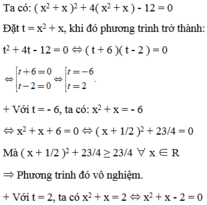Giải các phương trình sau:
a ) 12 x 2 + 30 x - 21 16 x 2 - 9 - 3 x - 7 3 - 4 x = 6 x + 5 4 x + 3
b ) x + 3 2 - x - 3 2 = 6 x + 18
1) Giải các phương trình sau : a) x-3/x=2-x-3/x+3 b) 3x^2-2x-16=0 2) Giải bất phương trình sau: 4x-3/4>3x-5/3-2x-7/12
\(a,\dfrac{x-3}{x}=\dfrac{x-3}{x+3}\)\(\left(đk:x\ne0,-3\right)\)
\(\Leftrightarrow\dfrac{x-3}{x}-\dfrac{x-3}{x+3}=0\)
\(\Leftrightarrow\dfrac{\left(x-3\right)\left(x+3\right)-x\left(x-3\right)}{x\left(x+3\right)}=0\)
\(\Leftrightarrow x^2-9-x^2+3x=0\)
\(\Leftrightarrow3x-9=0\)
\(\Leftrightarrow3x=9\)
\(\Leftrightarrow x=3\left(n\right)\)
Vậy \(S=\left\{3\right\}\)
\(b,\dfrac{4x-3}{4}>\dfrac{3x-5}{3}-\dfrac{2x-7}{12}\)
\(\Leftrightarrow\dfrac{4x-3}{4}-\dfrac{3x-5}{3}+\dfrac{2x-7}{12}>0\)
\(\Leftrightarrow\dfrac{3\left(4x-3\right)-4\left(3x-5\right)+2x-7}{12}>0\)
\(\Leftrightarrow12x-9-12x+20+2x-7>0\)
\(\Leftrightarrow2x+4>0\)
\(\Leftrightarrow2x>-4\)
\(\Leftrightarrow x>-2\)
Giải các phương trình sau: \(7x+6\sqrt{x+5}=x^2+30\)
\(7x+6\sqrt{x+5}=x^2+30\left(đk:x\ge-5\right)\)
\(\Leftrightarrow6\sqrt{x+5}=x^2-7x+30\)
Ta thấy 2 vế đều dương nên bình phương lên ta được:
\(36x+180=x^4+49x^2+900-14x^3+60x^2-420x\)
\(\Leftrightarrow x^4-14x^3+109x^2-456x+720=0\)
\(\Leftrightarrow x^3\left(x-4\right)-10x^2\left(x-4\right)+69x\left(x-4\right)-180\left(x-4\right)=0\)
\(\Leftrightarrow\left(x-4\right)\left(x^3-10x^2+69x-180\right)=0\)
\(\Leftrightarrow\left(x-4\right)\left[x^2\left(x-4\right)-6x\left(x-4\right)+45\left(x-4\right)\right]=0\)
\(\Leftrightarrow\left(x-4\right)^2\left(x^2-6x+45\right)=0\)
\(\Leftrightarrow x=4\left(tm\right)\) (do \(x^2-6x+45=\left(x^2-6x+9\right)+36=\left(x-3\right)^2+36\ge36>0\))
Bài 1:giải các phưng trình chứa ẳn ở mẫu sau;
a)4x-5/x-1=2+x/x-1 b)x-1/x-2-3+x=1/x-2 c)1+1/2+x=12/x^3+8 d02/x^2-9+x/x-3=1-3/x+3
Bài 2:giải các phương trình sau
a)4x/x^3+4x+3-1=6(1/x+3-1/2x+2) b)3/ 4(x-5)+15/50-2x^2=7/ 6x+30
Bài 1 :
\(\frac{4x-5}{x-1}=\frac{2+x}{x-1}\)ĐK : x \(\ne\)1
\(\Leftrightarrow\frac{4x-5}{x-1}-\frac{2-x}{x-1}=0\Leftrightarrow\frac{4x-5-2+x}{x-1}=0\)
\(\Rightarrow5x-7=0\Leftrightarrow x=\frac{7}{5}\)( tmđk )
Vậy tập nghiệm của phuwong trình là S= { 7/5 }
b, \(\frac{x-1}{x-2}-3+x=\frac{1}{x-2}\)ĐK : x \(\ne\)2
\(\Leftrightarrow\frac{x-1}{x-2}-\left(3-x\right)=\frac{1}{x-2}\)
\(\Leftrightarrow\frac{x-1}{x-2}-\frac{\left(3-x\right)\left(x-2\right)}{x-2}=\frac{1}{x-2}\)
\(\Leftrightarrow\frac{x-1-3x+6+x^2-2x-1}{x-2}=0\)
\(\Rightarrow x^2-4x+4=0\Leftrightarrow\left(x-2\right)^2=0\Leftrightarrow x=2\)( ktmđkxđ )
Vậy phương trình vô nghiệm
c, \(1+\frac{1}{2+x}=\frac{12}{x^3+8}\)ĐK : x \(\ne\)-2
\(\Leftrightarrow\frac{\left(x+2\right)\left(x^2-2x+4\right)+x^2-2x+4-12}{\left(x+2\right)\left(x^2-2x+4\right)}=0\)
\(\Rightarrow x^3+8+x^2-2x+4-12=0\)
\(\Leftrightarrow x^3+x^2-2x=0\Leftrightarrow x\left(x^2+x-2\right)=0\)
\(\Leftrightarrow x\left(x-1\right)\left(x+2\right)=0\Leftrightarrow x=0;x=1;x=-2\left(ktm\right)\)
Vậy tập nghiệm của phương trình là S = { 0 ; 1 }
d, đưa về dạng hđt
Bài 2 : làm tương tự, chỉ khác ở chỗ mẫu số phức tạp hơn tí thôi
Giải các phương trình sau: ( x 2 + x ) 2 + 4 ( x 2 + x ) - 12 = 0

⇔ ( x + 2 )( x - 1 ) = 0 ⇔ 
Vậy phương trình có tập nghiệm là S = { - 2;1 }.
giải các phương trình sau:
a, 5x-3=12
b, \(\dfrac{3}{x+1}=\dfrac{2}{x+2}\)
c, \(\left|2x+6\right|\)=x-3
a, 5x-3=12
<=> 5x = 15
=> x = 3
b, => 3(x+2) = 2(x+1)
<=> 3x + 6 = 2x + 2
<=> x = -4
c, TH1: 2x + 6 = x - 3
<=> x = -9
TH2: 2x + 6 = -x + 3
<=> 3x = -3
<=> x = -1
Giải các phương trình sau:
a) 2 x + 3 x − 3 + x x − 4 = 3 x − 5 2 ;
b) 4 2 x + 1 x + 2 = − x + 1 2 + 3 x − 1 2 .
Giải các phương trình sau:
a) 3 x − 1 2 − 2 − 6 x 5 = 1 2 + 3 x − 1 ;
b) x 2 + 2 x + 1 − x + 1 3 = 6 x + 1 2 − 5 x − 5 6 .
Bài 1: Giải các phương trình sau:
a) x - 2 = 0 b)x² – 2x =0
e) 2x² +5x +3= 0 f) x² –x-12 =0
a) \(x-2=0\Leftrightarrow x=2\)
b) \(x^2-2x=0\Leftrightarrow x\left(x-2\right)=0\Leftrightarrow\left[{}\begin{matrix}x=0\\x=2\end{matrix}\right.\)
e) \(2x^2+5x+3=0\Leftrightarrow\left(2x+3\right)\left(x+1\right)=0\Leftrightarrow\left[{}\begin{matrix}x=-\dfrac{3}{2}\\x=-1\end{matrix}\right.\)
f) \(x^2-x-12=0\Leftrightarrow\left(x-4\right)\left(x+3\right)=0\Leftrightarrow\left[{}\begin{matrix}x=4\\x=-3\end{matrix}\right.\)
Giải các phương trình sau:
\(\begin{array}{l}a)\;sinx = \frac{{\sqrt 3 }}{2}\\b)\;sin(x + {30^o}) = sin(x + {60^o})\end{array}\)
\(a)\;sinx = \frac{{\sqrt 3 }}{2}\)
Vì \(sin\frac{\pi }{3} = \frac{{\sqrt 3 }}{2}\) nên \(sinx = \frac{{\sqrt 3 }}{2} \Leftrightarrow sin\frac{\pi }{3} = sin\frac{\pi }{3}\) \( \Leftrightarrow \left[ \begin{array}{l}x = \frac{\pi }{3} + k2\pi ,k \in \mathbb{Z}\\x = \pi - \frac{\pi }{3} + k2\pi ,k \in \mathbb{Z}\end{array} \right.\)
\( \Leftrightarrow \left[ \begin{array}{l}x = \frac{\pi }{3} + k2\pi ,k \in \mathbb{Z}\\x = \frac{{2\pi }}{3} + k2\pi ,k \in \mathbb{Z}\end{array} \right.\)
Vậy phương trình có nghiệm là \(x = \frac{\pi }{3} + k2\pi \) hoặc \(x = \frac{{2\pi }}{3} + k2\pi \)\(,k \in \mathbb{Z}\).
\(\begin{array}{l}b)\;sin(x + {30^o}) = sin(x + {60^o})\\ \Leftrightarrow \left[ \begin{array}{l}x + {30^o} = x + {60^o} + k{360^o},k \in \mathbb{Z}\\x + {30^o} = {180^o} - x - {60^o} + k{360^o},k \in \mathbb{Z}\end{array} \right.\\ \Leftrightarrow x = {45^o} + k{180^o},k \in \mathbb{Z}.\end{array}\)
Vậy phương trình có nghiệm là \(x = {45^o} + k{180^o},k \in \mathbb{Z}\).
x2-4x+7 = 0 ⇔ x2 -4x + 4 + 3 = 0
⇔ (x-2)2+3=0 ⇔ (x-2)2=-3 (vô lí)
Vậy pt vô nghiệm
*Chứng minh phương trình \(x^2-4x+7=0\) vô nghiệm
Ta có: \(x^2-4x+7=0\)
\(\Leftrightarrow x^2-4x+4+3=0\)
\(\Leftrightarrow\left(x-2\right)^2+3=0\)
mà \(\left(x-2\right)^2+3\ge3>0\forall x\)
nên \(x\in\varnothing\)(đpcm)